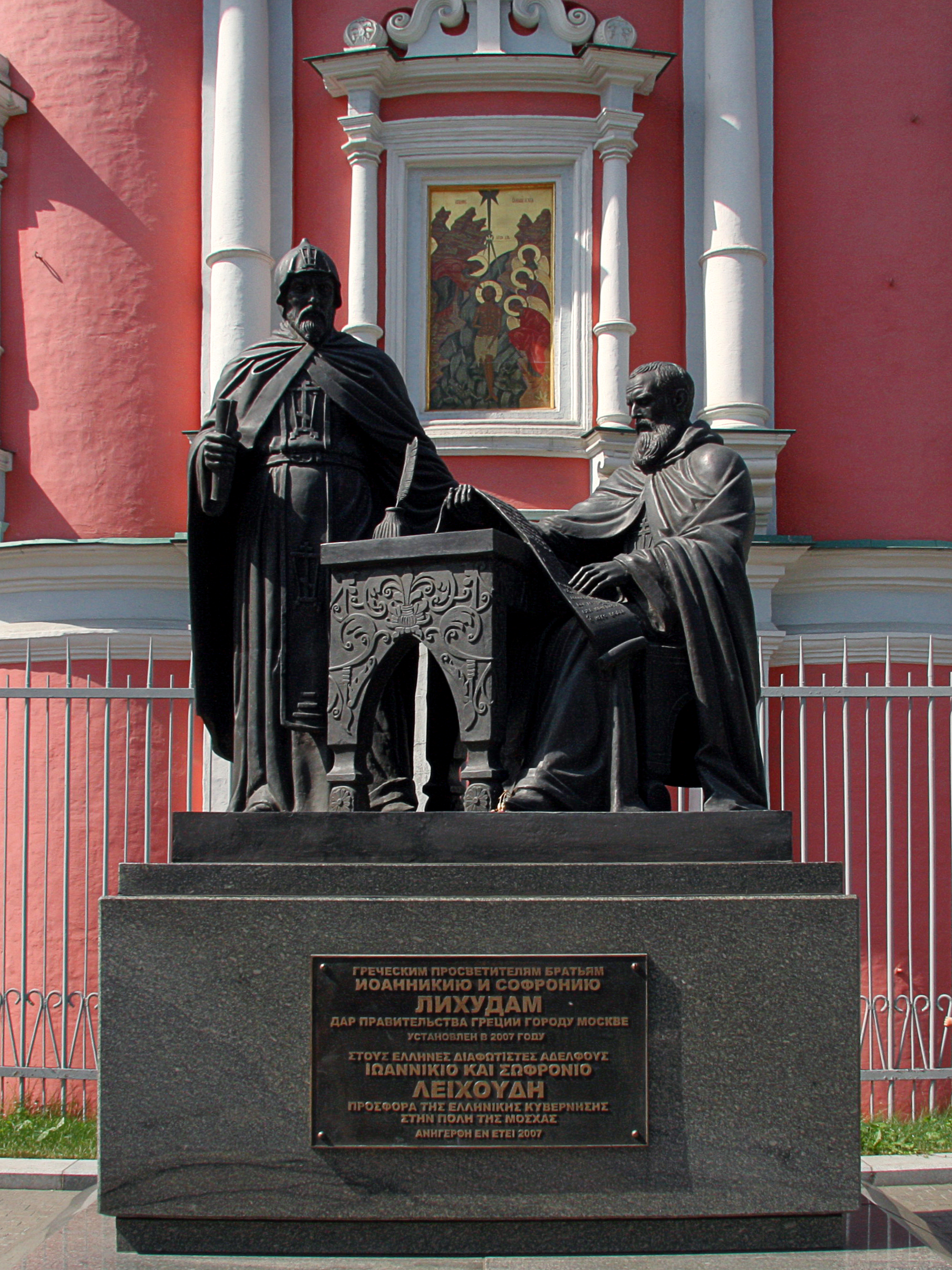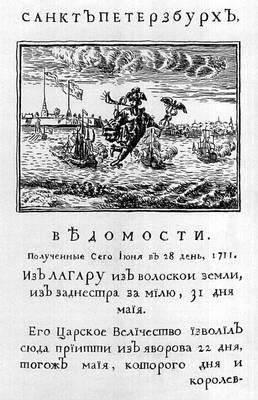|
Fedor Polikarpov-Orlov
Fedor Polikarpov-Orlov (russian: Фёдор Поликарпович Поликарпов-Орлов; 1660 – 12 January 1731) was a Russian writer, translator, and printer. He is most noted for his Slavonic ''Bukvar'' (Primer) that was widely used by Slavic-speakers (Poles, Ruthenians, Czechs, Slovaks, Serbs, Bulgars) both in Europe and throughout the Russian Empire. The historic significance of the 1701 Primer as a sample of book-printing trade lies in the fact that it was the first time in the history of Moscow book-printing that it was attempted to teach students the elements of not only one language but of three at the same time: Slavic, Greek and Latin. Polikarpov-Orlov graduated from the Slavic Greek Latin Academy in his birthplace of Moscow and later taught grammar, rhetoric, and poetic theory at the same academy. Between 1698 and 1722 he was first a proofreader at the ''Pechatnyi Dvor'' (Moscow Print Yard) and then he became the printshop director. From 1726 to 1731 he ... [...More Info...] [...Related Items...] OR: [Wikipedia] [Google] [Baidu] |
Edition Leipzig
Edition Leipzig was a publisher in the German Democratic Republic (GDR/DDR), which, for the most part, placed books on Western markets as an export publisher. This was intended to serve representative purposes as well as to procure foreign currency. Today, the publishing house is part of the Seemann Henschel publishing group, which was taken over by in October 2017 with a program on regional and cultural history. From 1960 to 1984 more than book titles were published, of which more than 500 were published in foreign languages and about 60 even in multilingual versions. In the first phase, which lasted up to 1965, the publication of scientific and technical books predominated. Later, cultural and art historical as well as popular scientific works were added to a greater extent. The Edition Leipzig became known for high-quality facsimiles and historical reprints. Fictional titles were rare, and marketing for this genre was discontinued as it was seen as not being profitable e ... [...More Info...] [...Related Items...] OR: [Wikipedia] [Google] [Baidu] |
Slavic Greek Latin Academy
The Slavic Greek Latin Academy (russian: Славяно-греко-латинская академия) was the first higher education establishment in Moscow. History Beginning The academy's establishment may be viewed as a result of the incorporation of the Left-Bank Ukraine into Muscovy after the Treaty of Pereyaslav. Under Fyodor Rtishchev's auspices, Epiphanius Slavinetsky and other learned monks moved from Kiev to Moscow and brought a taste for learning there. The Ukrainian and Polish influence was paramount at the court of Tsar Feodor III. In 1682, he signed the academy's charter ('), which had been elaborated by Sylvester Medvedev. The academy was organized in 1685-1687 under the guidance of two Greek brothers Joannicus and Sophronius Likhud on the premises of the Zaikonospassky Monastery with over 70 students. The academy was placed under the care of the Patriarch Prikaz. The curriculum was divided into several levels ("schools"), including Slavonic and Greek writing, ... [...More Info...] [...Related Items...] OR: [Wikipedia] [Google] [Baidu] |
Moscow Print Yard
The Moscow Print Yard (russian: Московский Печатный двор) was the first publishing house in Russia. It was established in Kitai-gorod at the behest of Ivan the Terrible in 1553. The historic headquarters of the Print Yard now house the Russian State University for the Humanities. The Moscow Print Yard was first mentioned in by Heinrich von Staden. It is known to have published ''Lenten Triodion'', ''Triodion in Pictures'', ''Gospel'', ''Psalter'', and other books which did not have any imprints (hence, another name for the Print Yard, the Anonymous Printing House). On March 1 of 1564, Ivan Fyodorov and Pyotr Timofeyev (Mstislavets) published the very first dated book called ''Apostle'' (Апостол) at the Moscow Print Yard. In 1565, the printing house published (, or Book of hours) and then ''Psalter'' (1568). In 1612, the Moscow Print Yard was destroyed by fire, but it was soon rebuilt. In 1620, a two-story stone chamber was erected for the Print ... [...More Info...] [...Related Items...] OR: [Wikipedia] [Google] [Baidu] |
Lexicography
Lexicography is the study of lexicons, and is divided into two separate academic disciplines. It is the art of compiling dictionaries. * Practical lexicography is the art or craft of compiling, writing and editing dictionaries. * Theoretical lexicography is the scholarly study of semantic, orthographic, syntagmatic and paradigmatic features of lexemes of the lexicon (vocabulary) of a language, developing theories of dictionary components and structures linking the data in dictionaries, the needs for information by users in specific types of situations, and how users may best access the data incorporated in printed and electronic dictionaries. This is sometimes referred to as 'metalexicography'. There is some disagreement on the definition of lexicology, as distinct from lexicography. Some use "lexicology" as a synonym for theoretical lexicography; others use it to mean a branch of linguistics pertaining to the inventory of words in a particular language. A person devoted ... [...More Info...] [...Related Items...] OR: [Wikipedia] [Google] [Baidu] |
Meletius Smotrytsky
Meletius Smotrytsky ( uk, Мелетій Смотрицький, translit=Meletii Smotrytskyi; be, Мялецій Сматрыцкі, translit=Mialiecij Smatrycki; russian: Мелетий Смотрицкий, translit=Meletiy Smotritsky; pl, Melecjusz Smotrycki), né Maksym Herasymovych Smotrytsky (c. 1577 – 17 or 27 December 1633), Archbishop of Polotsk (Metropolitan of Kyiv), was a writer, a religious and pedagogical activist of the Polish–Lithuanian Commonwealth, a Ruthenian linguist whose works influenced the development of the Eastern Slavic languages. His book "Slavonic Grammar with Correct Syntax" (1619) systematized the study of Church Slavonic and became the standard grammar book in Russia right up till the end of the 18th century. He believed in the revival of the Orthodox religion in traditionally Slavic lands (see Slavic people) centered in the Tsardom of Muscovy. General Born in Smotrych, Podilia, Meletius was a son of the famous writer and pedagogue Her ... [...More Info...] [...Related Items...] OR: [Wikipedia] [Google] [Baidu] |
Sankt-Peterburgskie Vedomosti
The ''Vedomosti'' (Russian: Ведомости) is Russia's oldest newspaper. It was established by Peter the Great's ukase dated 16 December 1702. The first issue appeared on 2 January 1703. Petrine Vedomosti Following along the lines of the 17th-century handwritten '' Kuranty'', Peter's newspaper contained little other than reports of military victories and diplomatic relations, either composed by the tsar himself or translated from Dutch newspapers according to his choice. Originally, the newspaper was published at the Print Yard in Kitai-gorod, Moscow. In 1710, engravings were introduced by way of decoration. They usually represented the Peter and Paul Fortress or the Neva River, thus reflecting the growing importance of Saint Petersburg. From 1711, most issues were printed in the Northern capital. Peter's ''Vedomosti'' was published quite irregularly, as important news arrived — sometimes as many as seventy issues appeared annually, sometimes only one. The circulation ... [...More Info...] [...Related Items...] OR: [Wikipedia] [Google] [Baidu] |
Bernhardus Varenius
Bernhardus Varenius (Bernhard Varen) (1622, Hitzacker, Lower Saxony1650) was a German geographer. Life His early years (from 1627) were spent at Uelzen, where his father was court preacher to the duke of Brunswick. Varenius studied at the gymnasium of Hamburg (1640–1642), and at Königsberg (1643–1645) and Leiden (1645–1649) universities, where he devoted himself to mathematics and medicine, taking his medical degree at Leiden in 1649. He then settled at Amsterdam, intending to practice medicine. But the recent discoveries of Abel Tasman, Willem Schouten and other Dutch navigators, and his friendship for Willem Blaeu and other geographers, attracted Varenius to geography. He died in 1650, aged only twenty-eight, a victim to the privations and miseries of a poor scholar's life. This cites: *Breusing, "Lebensnachrichten von Bernhard Varenius" (''Geogr. Mittheil.'', 1880) *H. Blink's paper on Varenius in ''Tijdschr. van het Nederl. Aandrijksk. Genotschap'' (1887), ser. ii. pt ... [...More Info...] [...Related Items...] OR: [Wikipedia] [Google] [Baidu] |
Leksikon Vokabulam Novym Po Alfavitu
The ''Leksikon vokabulam novym po alfavitu'' (russian: Лексикон вокабулам новым по алфавиту) is a Russian dictionary of foreign words written (but not published) during Peter the Great's reign, possibly ordered by him. It is now attributed to Fedor Polikarpov-Orlov and dated to 1715, with its compilation connected to a historical treaty by the same author. It consists of 503 foreign words that should be settled in the Russian vocabulary. Most of the words have now their space in the Russian language. For most foreign words a definition A definition is a statement of the meaning of a term (a word, phrase, or other set of symbols). Definitions can be classified into two large categories: intensional definitions (which try to give the sense of a term), and extensional definitio ... in Russian is provided, others have Russian synonyms. The types of word vary from art of war (e.g. ''armeya'' 'army', ''avangardia'' 'vanguard') to everyday words (e. ... [...More Info...] [...Related Items...] OR: [Wikipedia] [Google] [Baidu] |
1660s Births
Year 166 ( CLXVI) was a common year starting on Tuesday (link will display the full calendar) of the Julian calendar. At the time, it was known as the Year of the Consulship of Pudens and Pollio (or, less frequently, year 919 ''Ab urbe condita''). The denomination 166 for this year has been used since the early medieval period, when the Anno Domini calendar era became the prevalent method in Europe for naming years. Events By place Roman Empire * Dacia is invaded by barbarians. * Conflict erupts on the Danube frontier between Rome and the Germanic tribe of the Marcomanni. * Emperor Marcus Aurelius appoints his sons Commodus and Marcus Annius Verus as co-rulers (Caesar), while he and Lucius Verus travel to Germany. * End of the war with Parthia: The Parthians leave Armenia and eastern Mesopotamia, which both become Roman protectorates. * A plague (possibly small pox) comes from the East and spreads throughout the Roman Empire, lasting for roughly twenty years. * The ... [...More Info...] [...Related Items...] OR: [Wikipedia] [Google] [Baidu] |
1731 Deaths
Events January–March * January 8 – An avalanche from the Skafjell mountain causes a massive wave in the Storfjorden fjord in Norway that sinks all boats that happen to be in the water at the time and kills people on both shores. * January 25 – A fire in Brussels at the Coudenberg Palace, at this time the home of the ruling Austrian Duchess of Brabant, destroys the building, including the state records stored therein."Fires, Great", in ''The Insurance Cyclopeadia: Being an Historical Treasury of Events and Circumstances Connected with the Origin and Progress of Insurance'', Cornelius Walford, ed. (C. and E. Layton, 1876) p49 * February 16 – In China, the Emperor Yongzheng orders grain to be shipped from Hubei and Guangdong to the famine-stricken Shangzhou region of Shaanxi province. * February 20 – Louise Hippolyte becomes only the second woman to serve as Princess of Monaco, the reigning monarch of the tiny European principality, ascendi ... [...More Info...] [...Related Items...] OR: [Wikipedia] [Google] [Baidu] |
Writers From Moscow
A writer is a person who uses written words in different writing styles and techniques to communicate ideas. Writers produce different forms of literary art and creative writing such as novels, short stories, books, poetry, travelogues, plays, screenplays, teleplays, songs, and essays as well as other reports and news articles that may be of interest to the general public. Writers' texts are published across a wide range of media. Skilled writers who are able to use language to express ideas well, often contribute significantly to the cultural content of a society. The term "writer" is also used elsewhere in the arts and music, such as songwriter or a screenwriter, but also a stand-alone "writer" typically refers to the creation of written language. Some writers work from an oral tradition. Writers can produce material across a number of genres, fictional or non-fictional. Other writers use multiple media such as graphics or illustration to enhance the communication of ... [...More Info...] [...Related Items...] OR: [Wikipedia] [Google] [Baidu] |





